
We kindly inform you that, as long as the subject affiliation of our 300.000+ articles is in progress, you might get unsufficient or no results on your third level or second level search. In this case, please broaden your search criteria.



Książka dotyczy psychicznych determinant macierzyństwa. Autorka jest psychologiem klinicznym i to przesądza o charakterze tej pracy. Mamy tu próby wniknięcia w istotę i mechanizmy psychologiczne omawianych zagadnień (a nie tylko ich wyodrębnienie lub ocenę) oraz metodę badań charakterystyczną dla psychologii klinicznej – wyniki badań empirycznych z ich analizą ilościową i jakościową oraz dane uzyskane z sesji terapeutycznych. Ponadto, nie tylko przyjęta perspektywa psychologii klinicznej, lecz także w jej ramach doświadczającej siebie kobiety, która decyduje się na macierzyństwo lub brak potomstwa wyróżniają tę książkę spośród istniejących monografii na temat macierzyństwa i stanowią o jej unikatowości.
More...
Dzieci z rodzin z problemem alkoholowym stanowią grupę wysokiego ryzyka dotyczącego zaburzeń zdrowia psychicznego. Ostatnie szacunki wskazują, że w Polsce około 1,5 mln dzieci wychowuje się przy pijącym rodzicu. Dzięki licznym badaniom empirycznym coraz lepiej rozumiemy ich sytuację. Zaburzenia psychiczne rodziców bezpośrednio wynikające z uzależnienia oraz z nim współistniejące mogą negatywnie oddziaływać na zdrowie fizyczne i psychiczne dzieci i młodzieży na różnych etapach życia, jak też prowadzić do wystąpienia objawów eksternalizacyjnych i internalizacyjnych. Najnowsze prace naukowe podkreślają jednak duże zróżnicowanie populacji dzieci alkoholików, a wiedza empiryczna pozwala na coraz lepsze rozumienie mechanizmów odpowiedzialnych za to zróżnicowanie. Książka stanowi kontynuację zainteresowań autorki problematyką funkcjonowania dzieci alkoholików. Znaczne rozpowszechnienie problemu alkoholizmu w społeczeństwie skłania do nieustannego poszerzania wiedzy na temat dzieci uzależnionych rodziców oraz poszukiwania empirycznych dowodów na obecność istotnych dla ich rozwoju czynników ryzyka i zasobów. Wyniki tych badań mogą wpłynąć na poprawę skuteczności i efektywności programów profilaktycznych oraz działań interwencyjnych, kierowanych do dzieci i młodzieży szczególnie zagrożonych zbyt wczesnym i nadmiernym spożywaniem alkoholu oraz innych substancji psychoaktywnych.
More...
Niewątpliwymi atutami książki są z jednej strony rzetelna informacja o zmianach zachodzących w życiu młodych ludzi – podana w sposób logiczny i uporządkowany, z drugiej zaś – spojrzenie poradnikowe: jak dorośli mogą na te zmiany reagować i które reakcje pomagają, a które przeszkadzają w rozwoju i układaniu wzajemnych relacji. Autorka pokazuje trudności, ale przedstawia je jako normalne i rozwojowe, wyjaśnia, obala mity. Pisze w sposób wyważony, nie posługuje się stereotypami, nie straszy, lecz uspokaja, buduje zrozumienie, co nadaje całości konstruktywny, pozytywny wydźwięk. Praca łączy w sobie wysokie walory merytoryczne dobrej książki naukowej z przystępnością formy i lekkością pióra książki popularnej. Co więcej, zawiera jasne i cenne wskazówki dotyczące postępowania. To połączenie wiedzy, mądrości i dobrego stylu czyni z niej pozycję ze wszech miar wartą polecenia. /// Z recenzji prof. dr. hab. Piotra K. Olesia
More...
Autorka przedstawia problemy związane z dojrzewaniem dziewcząt i chłopców niepełnosprawnych intelektualnie. Omawia zmiany biologiczne, intelektualne, emocjonalne i społeczne pojawiające się w okresie dojrzewania, wyraziście ukazując spiętrzenie trudności w przypadku tej grupy młodzieży. Ukazuje specyfikę dorastania dziewcząt i chłopców, którzy zmagają się z trudnościami wynikającymi nie tylko z ich możliwości umysłowych, ale nierzadko również z tego, jak są odbierani przez społeczeństwo. Zwraca uwagę na negatywne zjawiska społeczne, takie jak stygmatyzacja, piętnowanie czy wykluczenie. Obok problemów dotykających samych niepełnosprawnych Autorka stara się przybliżyć Czytelnikowi również trudności ich najbliższych, którzy stają przed trudnym zadaniem opieki i wychowywania dziecka upośledzonego umysłowo. Żaneta Stelter obala także mity dotyczące zachowania niepełnosprawnych, m.in. mit „wiecznego dziecka” i mit „bezczynności”.
More...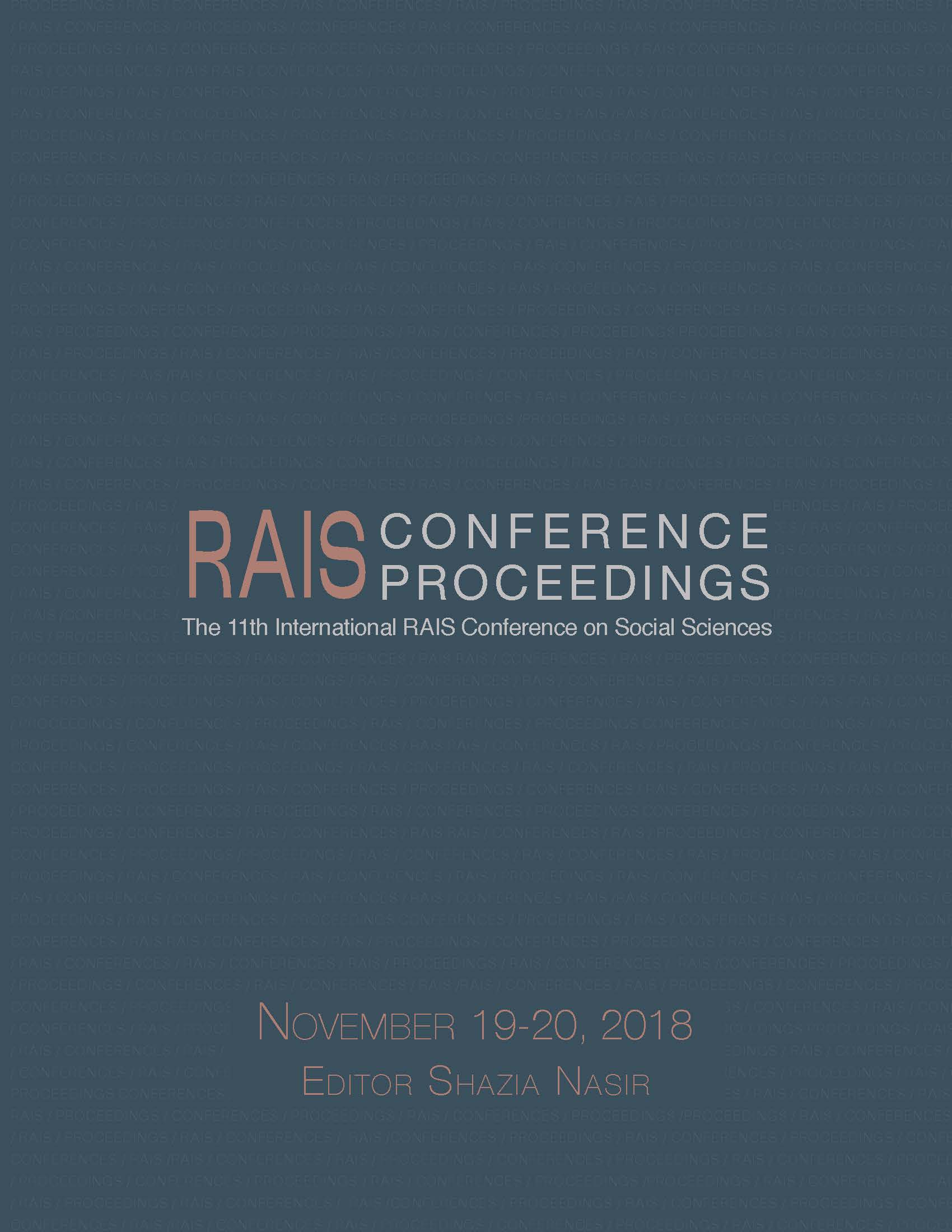
The role of entrepreneurship in societies has become more profound in recent times. Studies suggest that pre-exposure to an entrepreneurial environment while growing up can greatly contribute to an individual’s learning process as they see first-hand how entrepreneurial tasks and activities are performed. Growing up, or being exposed to such an environment might potentially reduce the uncertainty felt by a prospective young or new entrepreneur. The objective of this study was to explore the differences in several entrepreneurial variables between two South African female entrepreneurs’ pre-exposure to entrepreneurship groups. Group 1 represented female entrepreneurs who had no previous exposure from an entrepreneurial parent, close friend or relative and Group 2 included those who had some form of previous exposure from an entrepreneurial parent, close friend or relative. The study made use of a self-reporting questionnaire and used a convenience sample to collect data from female entrepreneurs. The final sample equated to 510 usable questionnaires which included responses from all nine South African provinces. Data were analysed using reliability and validity analysis, Multiple Analysis of Variance (MANOVA) and Analysis of Variances (ANOVA). Results indicated that just one variable, internal motivation, was influenced by pre-exposure to entrepreneurship. Entrepreneurs who were raised in a business environment; that is, having a parent, close friend or relative who managed an entrepreneurial business, reported a higher mean for internal motivation compared to those who did not have this exposure. Several studies suggest that benefiting from an entrepreneur role model such as a parent, close friend or relative may lead to a more positive outlook on entrepreneurship and a stronger inclination to start a business. The results from this study prove interesting as, in the case of South African female entrepreneurs, pre-exposure to entrepreneurship had little effect on the identified entrepreneurial factors with the exception of internal motivation.
More...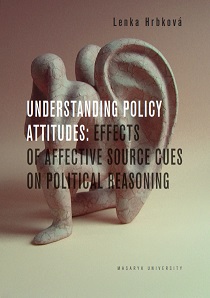
How do citizens form their political attitudes? How do political actors influence people’s political views in their everyday lives? Do people’s feelings towards political parties and politicians influence the public opinion? The book presents a series of laboratory experiments focused on the formation processes of citizens’ attitudes to political issues in the context of their emotional attachments to political actors. The research puts emphasis on negativity and negative feelings of citizens towards political actors and shows that this type of negative attachment influences the way people think about political issues. Since the experimental method is a newcomer in the field of Czech political science, the volume’s ambition is also to introduce experiments as a relevant and useful tool for extending knowledge of substantial political processes and phenomena.
More...
In the course of last five years, a team of psychologists from the Institute for Children, Youth and Family Research at the Faculty of Social Studies has observed a sample of over thousand people born in 1990-1994. If you are interested how these young adults think about themselves and about the world, where and with whom they live and what relations they have, you may find the answers here. The book is thematically complex and offers a probe into novel social-psychological phenomena, such as the identity of young Vietnamese adults in Czechia or the phenomenon of “friendship with benefits”.
More...
Emotional intelligence is nowadays an essential attribute of any efficient manager who is concerned about achieving great results and being successful in his career and life. One can state, according to experts in the area, that success-oriented management begins with the manager’s inner life management, which is a difficult task. Before leading others, one must be able to analyze oneself, understand oneself and control one’s own feelings and emotions, also to empathize and develop constructive relationships in order to get oriented towards one’s goals and towards success. So that an institution should make progress, it is essential for the manager to create a working climate meant to provide the staff with a positive state, full of confidence and optimism, honesty and comfort. A successful manager is characterized by flexibility, adaptability to diverse situations and a positive mood, which enhances the employees’ achievements. Therefore, creating a healthy positive climate involves activating the components of both the manager’s and the employees’ emotional intelligence. Good self-knowledge helps managers organize themselves better, be more emphatic and coordinate their employees’ activity more efficiently towards professional performance, acting optimistically, enthusiastically, persuasively and firmly in order to achieve the objectives. They are motivated for reaching the highest results, for accomplishing their aims and thus they mobilize their positive emotions for this purpose. Developed emotional intelligence, with all its components, represents an asset, providing extra credibility and being at the same time a condition for a top manager who acts efficiently in a well-functioning organizational background.
More...
The spreading of the new COVID-19 is changing priorities, bringing new challenges to medicine and disrupting the social-biological-psychological balance resulting in mental health consequences during the active epidemic but more important, in the sequel of the outbreak, with expected long-term effects. First, there are psychiatric patients that tend to be less compliant to containment measures and therefore can present higher risk of infection. Moreover, official protocols recommend the stop of most antipsychotic drugs during infection with Covid-19 which can lead to relapse of mental disorder. On the other hand, restrictions in the healthcare units are impacting the relationship and contact between doctor and patient which in some cases, are psychological comforting and reassuring for the ill during treatment. Another aspect targets general population. The quarantine, work shutdown, self-isolation and unemployment are powerful stress factors with possible significant rise in depression, anxiety, obsessive-compulsive disorder, sleeping disorders, substance abuse (mainly alcohol) and suicidal behaviors. Loneliness and lack of normal daily routine, even in the era of internet and social media can bring up the importance and necessity of human contact and diversified activity. Isolation and closing of educational activity can increase incidence of domestic violence and child abuse within families with such problems but also new such cases can emerge due to stress and tensions between family members. Healthcare workers tend to be affected mainly by stress, lack of sleeping and burnout. All variables must be analyzed on account of prevention and management.
More...
The paper includes materials from the International Scientific Conference "Psychology in the Third Millennium - Problems and Solutions" (25.10.2019) and the Conference of Students - Future Psychologists (26.10.2019). The scientific achievements presented in this collection are useful both for specialists in the field of psychology and for specialists in the field of education, medicine, social work, who are interested in the present and future of psychology.
More...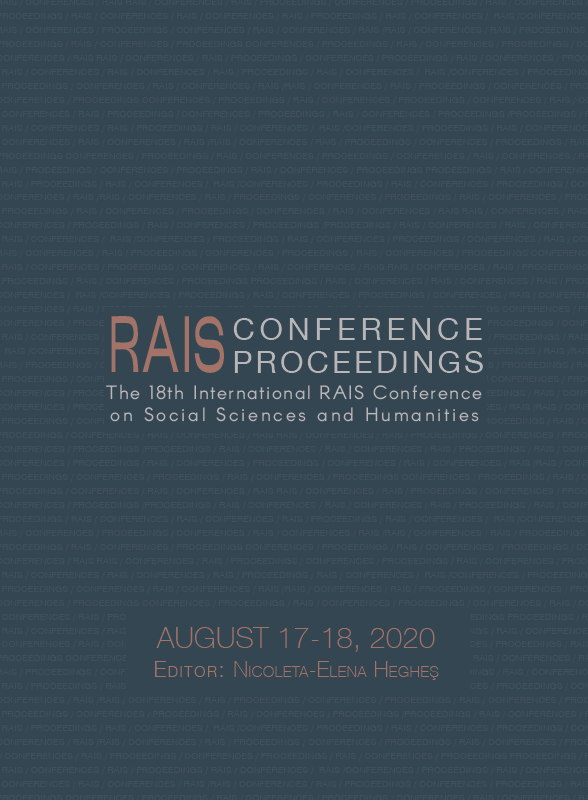
The present paper examines the relationship between requester's feeling of entitlement and the types of politeness strategies they use. According to Brown and Levinson's model of politeness (1987), speakers choose their preferred super-strategy as well as the complication level of the act based on calculations they perform on the act. These calculations are influenced by three factors, namely, Power(P), Distance(D), and Rank of imposition(R). The first two factors relate to the assumed relationship between the interlocutors during the interaction, and they are easily measured based on the social and contextual factors governing the situation. However, the weight of R can not be accurately measured, and although it is done spontaneously by language users, it cannot be left to the instinctive evaluation of the researcher. Therefore, one factor that is assumed to affect the weight of the imposition, entitlement, is placed under consideration in this research. Using the sociopragamtic approach, the researcher analysed a two-question questionnaire that ask university students to freely discuss what they want from their course instructor (the researcher). The only difference between the two questions is related to the sample's evaluation of their entitlement in the requested acts. In the first question, they were asked to write their rights, while in the second they were asked to write their wishes. The results detected a preference of the NP super-strategy in the respondents' answers regarding what they believed to be entitled to. Moreover, flouting the quantity maxim was an observed pattern in the responses to the question related to their assumed rights. Both findings suggest that entitlement can be manipulated by the speaker to trick the requestee into believing in the requester's right to the requested act, hence, reducing the rank of imposition.
More...
The changes in digitalized society are reflected in the family and school environment.Nowadays children are characterized as “Homo zappiens” (Veen & Vrakking, 2011) or “digi” generation (Gold, 2016) because they are growing up using modern technology (mobile phone, computer, iPod etc.) since early childhood. The use of new communication technologies by children induced major changes in play, learning and parenting. They learn and play in a global and digital culture. This could lead to huge discrepancies between generations, especially between parents and children, children and educators. This is because homo zappiens are digital, whereas parents are analogous sometimes. If we add to these characteristics of society the values that dominate postmodernism (hedonism, individualism etc.) we will have a clearer picture of the challenges of education today and especially, in parenting. We need to redefine the children-parents-educators relationship through a new set of criteria. Wellbeing is an important aspect of the family environment which determinates school integration and success.This article focuses on research in parents` perception regarding the parenting in digitalized society and children`s wellbeing.The research was embedded in a constructivist-interpretivist paradigm, which employed both quantitative and qualitative methods for data collection. This study included a number of 100 participants, children and their parents.Conclusion: The parents need to develop a new mind, set on children`s wellbeing and rethinking the parenting in digitalized society. A training program for parents must be a solution for develop children`s well-being at home as a condition for school.
More...
The paper highlights the effective psychological and pedagogical directions of persons who are in places of imprisonment. The problem of returning to a normal lifestyle today is very topical, the social maladjustment of former convicts, unwillingness to leave the former antisocial environment, insufficient or no education in general, irrational motivational sphere, low level of self-esteem and concentration on the main criteria of psychological and social health, become obstacles to re-socialization for those who are in the imprisonment places.In order to develop psychological and pedagogical support of social adjustment for people who are or are going to leave the prison, the diagnosis of psychological characteristics is relevant, which will be the key elements to the effectiveness of the applied directions that are as follows: focus on changing the social environment; socio-psychological therapy; professional orientation during the educational process.The following methods were used for scientific research as analysis of scientific literature, theoretical research methods, which study scientific and methodological literature on the problem of individual social adjustment for those who leave the prison; empirical research methods based on psychological and pedagogical observation of cognitive, labor-intensive activities and the use of professionals working at the same time, psychologists and teachers during the re-socialization of imprisoned. The research shows two stages of a pilot study, during which there was implied the diagnosis of intellectual, educational motivation, nonverbal creativity, equal self-esteem and changes in concentration of imprisoned.
More...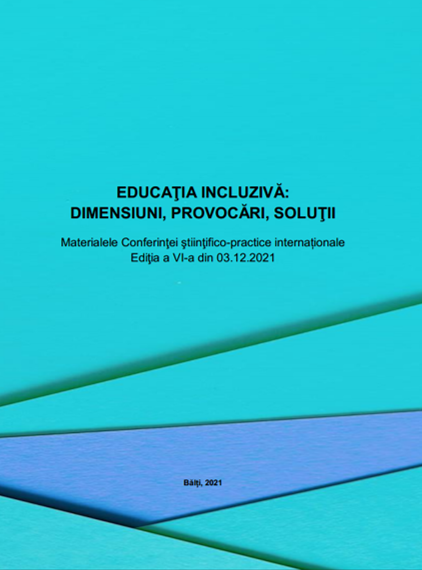
Quality education involves organizing the educational process that meets the individual educational needs of all students so that each of them can find their place in this process of building their own knowledge, meanings and skills that will later help them become members. responsible and active of society. Everyday activities must ensure equal opportunities for learning and participation for each child, based on the needs and potential of the learner. Therefore, in organizing the educational process, individualization claims to be an indicator that would reflect a fair and participatory process. Co-teaching is a solution in ensuring the differentiation and individualization of training in the inclusive class.
More...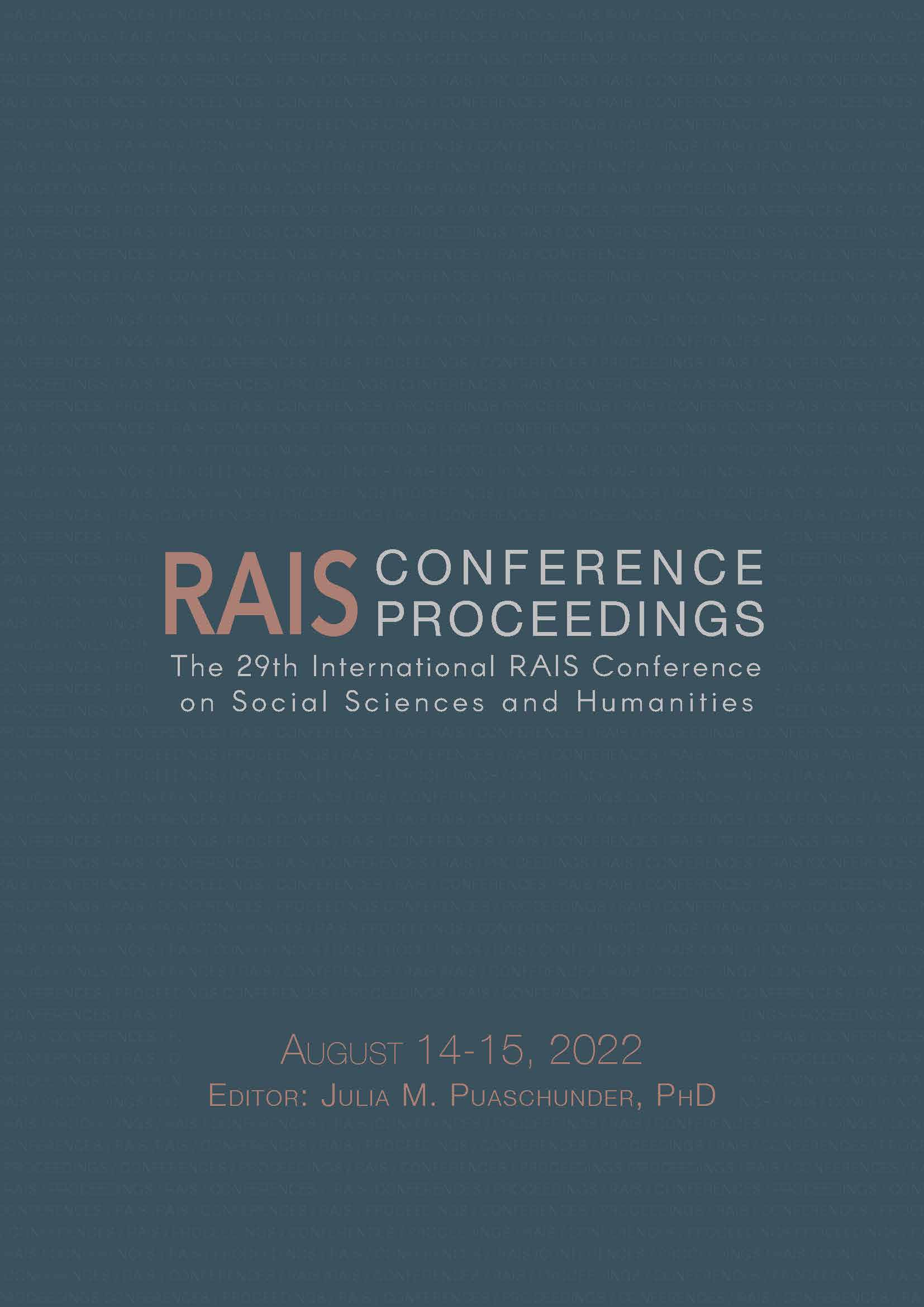
Our personality system is composed of cognitive, motivational, affective, aptitude and behavioral structures. Of all these, behavior represents the way we externalize ourselves and thus, causes us to act differently in certain situations. A category of prosocial behaviors regarding the defense of law and justice are presented, but also antisocial behaviors that defy any social norm. An important role is represented by both motivation and affectivity - mechanisms for stimulating behavior, to which are added needs and wants, those intermediate states that influence behavior. Also, the main forms of psychosocial influence, strategies of persuasion and manipulation, as well as the effects of psychosocial influence will be presented.
More...
Rodinný systém se neskládá jen z dyády matka–dítě, ale zahrnuje také vztah partner ský, případně vztahy mezi sourozenci. Všechny tyto subsystémy se vzájemně ovlivňu jí (Belsky, 1981; Minuchin, 1974). Partnerský subsystém je vnímán jako klíčový prvek pro kvalitu rodinného života (např. Erel & Burman, 1995; Haavio Mannila, 1971; Ste ger & Kotler, 1979), přičemž se předpokládá, že kvalita partnerského vztahu ovlivňuje adaptaci a vývoj samotného dítěte právě skrze působení na vztah rodič–dítě.
More...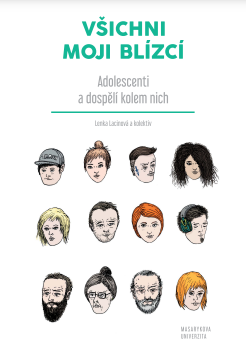
Proces dospívání s sebou přináší změny v oblasti blízkých vztahů. Výrazně se začíná proměňovat charakter vztahů s rodiči, prohlubuje se význam přátelství dospívajících a zcela nově se v životě mladých lidí objevují první partnerské „pokusy“ na poli lásky. Jedním z důležitých úkolů, které v období adolescence musí dospívající plnit, je posilování soběstačnosti při regulaci vlastních emocí a psychických stavů. Důle žitou součástí procesu získávání větší autonomie a nezávislosti je rozvoj schopnosti postupně se méně a méně spoléhat na rodiče v situacích, které vyžadují zvládání a zpracování negativních emocí. Transformaci podoby vztahů s rodiči napomáhá v tomto období i skutečnost, že vrstevnické a přátelské vztahy umožňují dospívají cím zažívat v jejich rámci více intimity a získávat více opory, než tomu bylo v dětství. Dalším faktorem, který přispívá k proměně vztahů s rodiči, je vzrůstající potřeba poznávání, explorace a zvládání nových situací a orientace v nových kontextech a prostředích.
More...
The teacher's work is determined by a complex system of expectations and direct tasks out of which other related, continuous or occasional activities arise. Some of them are clearly visible and frequent, or more familiar to the wider environment, whereas others occur in specific situations in the educational process, they are not so well known, and they often require an additional burden on an individual or a group. The teacher's work differs, it is adapted to the program aspects, the age of students, and other factors that directly or indirectly determine the mandatory, legally prescribed, or otherwise unwrittten but expected actions in the light of what is usually perceived as the teacher's work. The factors that affect the teacher's role and professional behavior come from a wider socio-cultural environment in which a teacher lives and accomplishes his professional role, such as educational and cultural traditions, the educational structure of the population, the current social, economic and political situation. In this paper, the focus is put on the circumstances that determine teachers' work and the factors that have a daily effect on the teacher and the overall school system, and 490furthermore we want to point out the present beliefs that it is a relatively easy job, with short working hours and many benefits. The lack of information, the lack of interest, the avoidance of having an objective approach and analysis, or sometimes the misinterpretation of the teacher's role and importance in the society can lead to prejudices that may in return cause harm to all those who are included in the educational process.
More...